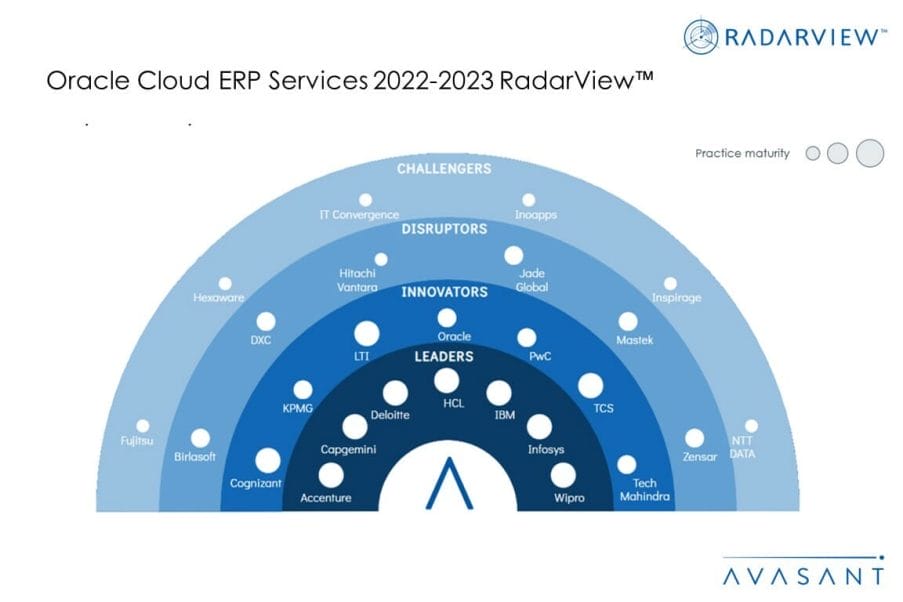Oracle Cloud ERP is gaining ground among legacy Oracle Applications customers as well as net new buyers looking for a modern cloud suite. It provides capabilities to automate business processes, deliver improved reporting and analytics, and secure enterprise data. To deliver these benefits, service providers are leveraging proprietary tools, providing industry-specific functionality, and implementation accelerators for Oracle Cloud ERP migrations. These trends, and others, are covered in Avasant’s Oracle Cloud ERP Services 2022-2023 RadarView™.
The report is a comprehensive study of Oracle Cloud ERP service providers. It takes a close look at the leaders, innovators, disruptors, and challengers in this market. It addresses the need for customers to accelerate their digital journeys, embrace the cloud, and identify the right Oracle Cloud ERP service providers.
We evaluated 33 service providers using three dimensions: practice maturity, partner ecosystem, and investments and innovation. Of the 33 service providers, 26 are recognized as having brought the most value to the market over the past 12 months.
The report recognizes platform vendors in four categories:
-
- Leaders: Accenture, Capgemini, Deloitte, HCL, IBM, Infosys, and Wipro
- Innovators: Cognizant, KPMG, LTI, Oracle, PwC, TCS, and Tech Mahindra
- Disruptors: Birlasoft, DXC, Hitachi Vantara, Jade Global, Mastek, and Zensar
- Challengers: Fujitsu, Hexaware, IT Convergence, Innoapps Inspirage, and NTT DATA

“Oracle continues to support its older ERP systems, such as E-Business Suite, J.D. Edwards, and PeopleSoft, but the road map for all of them leads to Oracle Cloud ERP,” said Frank Scavo, president of Avasant Research. “We are seeing a lot of older Oracle customers taking a hard look at when and how they should go down that road.”
The full report provides a number of findings, including the following:
-
- Enterprises are accelerating their transition from legacy systems to Oracle Cloud ERP to tackle business challenges arising from customized, disparate, and outdated systems. Organizations are leveraging advisory and consulting services from service providers to assess their existing infrastructure before moving to Oracle Cloud ERP. These include benchmarking financial performance to redesign business processes, analyzing cloud adoption ROI, building the business case, and calculating total cost of ownership.
- Oracle Cloud ERP unifies reporting across multiple systems, allowing enterprises to speed up report generation and shorten financial consolidation time. It also helps automate business processes, streamline operations, reduce downtime, and improve efficiency.
- Enterprises want service providers who understand their business requirements and offer industry-specific solutions and accelerators. They look for service providers who have Oracle Cloud-certified consultants to handle their end-to-end transformation projects.
“Oracle Cloud ERP is not just a cloud version of Oracle’s older ERP systems—it is a whole new level of user experience,” said Gaurav Dewan, associate research director with Avasant. “If you want to get the benefits, you really need to get assistance from someone who has helped other organizations make that journey.”
The full report also features RadarView profiles of the top 26 service providers, including their solutions, offerings, and experience in assisting enterprises in digital transformation.
This Research Byte is a brief overview of the full Oracle Cloud ERP Services 2022-2023 RadarView™ (click for pricing).




